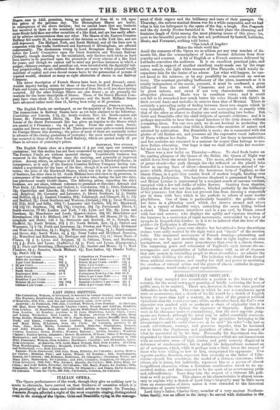ITALIAN OPERA.
The Opera performances of the week, though they give us nothing new in music to chronicle, have carried on that freshness of sensation which it is the peculiarity, of fine voices and cultivated artists to inspire. On Tuesday, Luerezia Borgia afforded a night of the most exquisite singing, distinguished even in th( annals of the Opera; emiai and Brambilla vying in the manage- ment of their organs and the brilliancy and taste of their passages. On Thursday, the serious musical drama was for a while suspended, and we had what is but too infrequent in the opera of the day, a laugh. Don Pasquale ' and the sly dowdy Norman furnished it. We must place the charming and ' feminine laugh of Grisi among the most pleasing music of this piece; for, next to the beautiful quartet in the last act, performed by herself; Lablache, Mario, and Fornasari, nothing told better.
"One touch of laughter
Makes the whole world kin.
Amid the romance of the Opera we so seldom get any true touches of do- mestic life, that the commonplaces of home become delicious from their scarcity and contrast. A bit of English or a French sentence delivered by Lablaohe convulses the audience. It is an excellent practical joke, and comes well in support of another excellent ready-made one by the stage tailor, namely, the light white trousers of Don Pasquale, which totally in- capacitate him for the duties of an adorer. Let what will happen, he can- not kneel to his mistress, or by any possibility be conceived an undone lover. The constant prevailing buffoonery of the piece, inasmuch as it is totally independent of the music, presents, it must be confessed, a great falling-off from the school of Cimarosa; and yet the work, aided by great talents, and sweet if not very characteristic strains, is altogether pleasant. Mario was in excellent voice; and it could not fail to be remarked how much better his voice blends with Grisi's in their several duets and melodies in octaves than that of Moriani. There is certainly a prevailing unity of feeling between these two singers which is • very beautiful. The performance of the one corresponds so exactly with. thatof the other as almost to display one soul animating two bodies. But ' *. Grisi and Brambilla offer the chief subjects of operatic criticism; and it is perhaps impossible to hear these signal heroines of the lyric drama without comparing them. For our own part, we do not hesitate in preferring the latter. We must confess that Grisi is divine—the musician of nature and adorned by cultivation. But Brambilla is more; she is connected with the glories of old Italian art, and possesses all the expressive vocal inflections of Pasta without her faults. The wildness of her fancy is inconceivable; and her roulades are executed in a manner far neater than belongs to mo- dern Italian education. Our hope is that we shall still retain her wonder- ful talent as long as it lasts.
There was a new ballet on Thursday—Diane. To shed fresh lustre on the parting glimpses of the Queen of the Ballet, the Queen of Night was called down from the scenic heavens. The moon, after traversing a rack of gauze clouds—her path through the sky reflected on the placid lake ' below in moving lines of silver—descended in a luminous shroud of va- pour; which, dispersing, revealed the beauteous farm of Taglioni, as the chaste Diana, in a pale blue muslin frock of modest length, bending over the sleeping Endymion. The handsome shepherd is personated by Perrot, and Mount Latmos is represented by a compact conch of canvass verdure, canopied with a few tall stalks of white flowers. Starting from slumber, Endymion at first sees not the goddess, blinded probably by the brilliancy of her presence: but that does not prevent him from dancing a coquettish pas de deux with her; which is the prelude to others of more tender playfulness. One of them is particularly beautiful: the goddess veils her form in a glittering scarf, which. she throws around and above her in a variety of fanciful ways, mimicking the moon hiding behind a cloud. These amorous interviews end in a pas seul, by Diana armed with bow and arrows; who displays the agility and vigorous freedom of the huntress in a succession of rapid movements, surrounded by a bevy of nymphs in leopard-skin kirtles: so it is to be inferred that the love of the goddess for Endyinion is all moonshine. Some of Taglioni's poses were classic ; but her attitudes from theantique statues were sadly marred by the tight waist and "bustle" of the modern belle. The unnatural movements of French dancing—pirouetting and poising on one leg and stretching out the other at right angles—are also incongruous, and appear more preposterous than ever in a classic theme. The surpassing grace and refinement of Taglioni's style invests the ex- travagancies and angularities of ballet-exercises with an air of elegance that aids custom in reconciling people to these absurdities: we admire the artiste while disliking the school. The ballerina who should first discard these artificial conventions, and employ her skill and power in emulating the rreedom of natural action and the grace of classic attitudes in appro- priate costume, would make a great reputation.


























 Previous page
Previous page